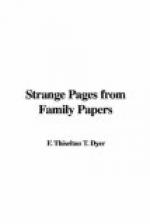No small consternation was caused by this unlooked-for contretemps; but the young Viscount made light of it to his fair bride, dispelling her alarm by explanations which satisfied her natural curiosity. But, it is said, in after days, this unpleasant episode created an unfavourable impression in her mind, and at times made her give way to feelings of a despondent character. As events turned out, the curse of her marriage day was in a great measure fulfilled. It is true she became a prominent beauty of the Court of Charles ii., and was painted with less than his usual amount of drapery by Sir Peter Lely. It is recorded also, that she twice gave an asylum to Monmouth, in the room at Rushton, still known as the “Duke’s Room”; but, living unhappily with her husband, she died, notwithstanding her enormous fortune, in comparative penury, at Kettering, at a great age, as recently as the year 1713.
A curious tale of love and deception is told of Bulgaden Hall, once—according to Ferrers, in his “History of Limerick”—the most magnificent seat in the South of Ireland—erected by the Right Hon. George Evans, who was created Baron Carbery, County of Cork, on the 9th of May, 1715. A family tradition proclaims him to have been noted for great personal attractions, so much so, that Queen Anne, struck by his appearance, took a ring from her finger at one of her levees, and presented it to him—a ring preserved as a heir-loom at Laxton Hall, Northamptonshire. In 1741, he married Grace, the daughter, and eventually heiress of Sir Ralph Freke, of Castle Freke, in the County of Cork, by whom he had four sons and the same number of daughters; and it was George Evans, the eldest son and heir, who became the chief personage in the following extraordinary marriage fraud.
It appears that at an early age he fell in love with the beautiful daughter of his host, Colonel Stamer, who was only too ready to sanction such an alliance. But, despite the brilliant prospects which this contemplated marriage opened to the young lady, she turned a deaf ear to any mention of it, for she loved another. As far as her parents could judge she seemed inexorable, and they could only allay the suspense of the expectant lover by assuring him that their daughter’s “natural timidity alone prevented an immediate answer to his suit.”
But what their feelings of surprise were on the following day can be imagined, when Miss Stamer announced to her parents her willingness to marry George Evans. It was decided that there should be no delay, and the marriage day was at once fixed. At this period of our social life, the wedding banquet was generally devoted to wine and feasting, while the marriage itself did not take place till the evening. And, according to custom, sobriety at these bridal feasts was, we are told, “a positive violation of all good breeding, and the guests would have thought themselves highly dishonoured had the bridegroom escaped scathless from the wedding banquet.”




